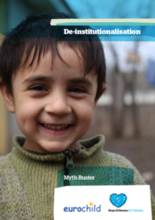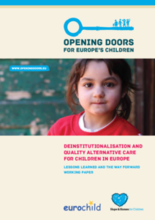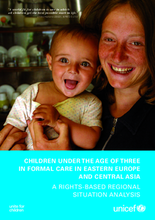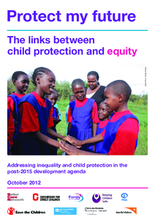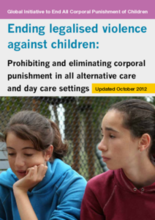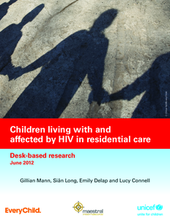Displaying 601 - 610 of 772
The purpose of this review was to identify evidence-based early response strategies and interventions for improving the outcomes of children outside of family care, including children of and on the street, institutionalized children, trafficked children, and children affected by conflict and disaster, and who are exploited for their labor. A conclusion was drawn that there is a strong need for strengthening the evidence base regarding the effectiveness or early assessments and responses to children living outside family care and for using evidence to guide operational policy and practice.
This briefing paper seeks to address key misunderstandings about de-institutionalisation. It explains what it is and what it is not and addresses key questions often asked about the need for such institutions, the role they play and the impact of this transformation and what it entails.
This paper aims to raise awareness on the perverse effects of institutionalisation on children and it calls for comprehensive system reforms, starting with a transition towards family and community-based care. It highlights country level lessons learnt in the European context that demonstrate how deinstitutionalisation can be achieved in practice.
This data pack, produced by the Department for Education, aims to summarize national data about children who leave care aged 16 and over and outcomes of care leavers at age 19. The pack was also developed to help local authorities to compare their performance with others and to investigate issues such as age of leaving care and placement stability on the outcomes of care leavers.
Through a comprehensive statistical analysis and literature review, this UNICEF report provides a child rights-based up-to-date review of the situation of children under the age of three in formal care in the countries of Central and Eastern Europe and the Commonwealth of Independent States (CEECIS).
The lack of care and protection facing children is a global crisis. This paper is part of an inter-agency series originally developed to feed into the global thematic consultation for the post MDG framework: ‘Addressing Inequalities. The Heart of the Post-2015 Development Agenda and the Future We Want for All.’ It looks at the relationship between this lack of care and protection and inequality. It explores how inadequate care and protection produces and contributes to inequalities and how inequality is itself a cause of inadequate care and protection. The paper also examines the long-lasting impact of inadequate care and protection which greatly affects children’s life chances into adulthood, suggesting that inadequate care and protection is in itself a form of inequity.
The report provides guidance on achieving law reform which gives children in alternative care and day care the protection from all forms of corporal and other cruel and degrading punishment that is their absolute right.
Virginia Commonwealth University Professors, Karen Smith Rotabi and Rosemary Farmer, examine impact of neglect on brain development in their recent podcast, Orphaned and Vulnerable Children and Brain Development. Through the persepective of the intersection of neuroscience and social welfare practice, Farmer and Rotabi examine how poverty of experience and such potential adverse situations as institutionalization disrupt brain development in babies and young children.
In this video, film-maker Kate Blewett finds out what a lifetime in the care of the state really means for Ukraine's forgotten children.
Desk review of existing literature and research to track the extent to which the HIV pandemic has been a driver of growth in children’s residential care and the situation of HIV affected children in care.

